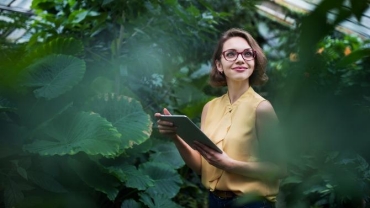
Aviation sector must become more sustainable faster
30/06/21
Use of biofuel certificates can speed up sustainability process in aviation
CO2 emissions from flying must go down and we will no longer have to feel ‘flight shame’ in the future if we can deploy sustainable solutions. But we need proper regulation for that. The Clean Skies for Tomorrow report by the World Economic Forum (WEF) and several partners, including PwC, discusses the system of biofuel certificates in aviation and how the methodology to measure CO2 impact can accelerate emission reductions in the sector. PwC sustainability specialists Joukje Janssen and Wineke Haagsma explain why biofuel and biofuel certificates are important to speed up the sustainability process in aviation and how PwC itself contributes positively to this process.

Factors impeding sustainability
‘The aviation sector is looking for sustainable alternatives with lower emissions, but the technology for electrically powered planes, for example, is not yet mature enough’, says Haagsma. ‘In addition, the innovation process is slow due to extreme safety requirements that innovations must meet and the fact that aircrafts are only written off as depreciation after about thirty years.’
Janssen: ‘These impeding factors are very valid, but a somewhat conservative corporate culture was also a reason why it took a long time before the aviation sector started thinking about a more sustainable business model. But the urgency has now dawned, because the sector realises that the impact of climate change will be far greater than the current corona pandemic.’
Accelerate biofuel production
‘In the long term, electric planes are a very good alternative,’ says Haagsma. ‘But we are not there yet, even though the clock is ticking. Now, the use of biofuel is the most sustainable solution in the aviation sector, besides “not flying”. Biofuels can yield a significant CO2 reduction.’
The price of biofuel is higher than that of kerosene and if aircraft operators cannot bear the full cost of Sustainable Aviation Fuel (SAF), the SAF certificate plays an important role. Biofuel producers generate a SAF certificate for every tonne of SAF they produce from sustainable raw materials. Janssen: ‘By purchasing these certificates, companies and private individuals contribute to emission reductions in aviation, because these purchases generate new income for the accelerated increase of SAF production capacity.’
‘The standards that are now being developed address the broader impact of environmental regulations and the WEF report urges aviation to be included as well. In this way, buyers of biofuel and biofuel certificates can show that they are investing in emission reduction. That's the only way you'll get the masses along.’
Sustainability reporting
The Clean Skies for Tomorrow report argues in favour of accelerating the movement towards SAF and SAFc. But you won't get that acceleration if those investments cannot be included in official sustainability reports. Haagsma: ‘If you want to push a new technique and a new product, it’s important that the fact that you are making a sustainable investment is also recognised.’
Worldwide, it is now being examined which standards should be used for classifying and calculating environmental aspects. Janssen: ‘The standards that are now being developed address the broader impact of environmental regulations and the WEF report urges aviation to be included as well. In this way, buyers of biofuel and biofuel certificates can show that they are investing in emission reduction. That's the only way you'll get the masses along.’
Promoting innovation in the ‘system’
PwC also feels a responsibility to change something about the ‘system’. Haagsma: ‘We think it’s important to contribute to the bigger picture. For example, in June 2019 we concluded a five-year contract with Sky Energy, the Board Now programme, in which we agreed that we will purchase biofuels for a minimum of five years.’
‘The contract started this year and its relatively long duration makes it possible to realise the first fully bio-kerosene plant in Europe. This will be realised in Delfzijl. It has been agreed that in those five years we will reduce at least five thousand tons of CO2 by purchasing biofuel.’
Other examples are two large donations that PwC made in 2017 to promote innovative sustainability in aviation. Haagsma: ‘We donated the first electric aircraft in the Netherlands, the Pipistrel, to the Royal Netherlands Aerospace Centre (NLR) for further research into electric flying. In addition, PwC made a donation to the Sustainable Flying Platform, which has recently enabled charging stations for electric aircraft to be installed.’
Responsibility towards customers
PwC also has a great responsibility towards customers when it comes to sustainability. Janssen: ‘We advise our clients on how they can incorporate sustainability aspects into their strategy and business operations. Our pro bono contribution to the report Clean Skies for Tomorrow also fits in nicely with this, because this report explains to companies and organisations how, for example, SAF certificates work and what you can do with them.’

‘It’s very important for PwC to reduce CO2 emissions caused by flying. In addition to stimulating innovation in the chain, we do this by purchasing SAF certificates and reducing emissions.’
PwC's CO2 compensation and reduction
PwC is also working on reducing emissions within its own operation. With a clear circular ambition that is in line with the SDGs of the UN, PwC expressed their Net Zero 2030 ambition in 2015, in other words, the aim to have no CO2 emissions by 2030.
Haagsma: ‘A large part of PwC's carbon footprint is caused by flying. In 2015 this was thirty percent. In other areas, we were able to become more sustainable much faster, for example by electrifying our car fleet. As a result, the share of flying in our total CO2 emissions is increasing. In the year before the Covid-19 pandemic started, that was already fifty percent.’
‘It’s very important for PwC to reduce CO2 emissions caused by flying. In addition to stimulating innovation in the chain, we do this by purchasing SAF certificates and reducing emissions. The latter comes down to formulating policies that reduce business flights and encouraging alternatives, such as train travel or online meetings. We are happy that we can contribute in different ways. For us, obtaining these insights is crucial in becoming more and more sustainable as an organisation.’





















